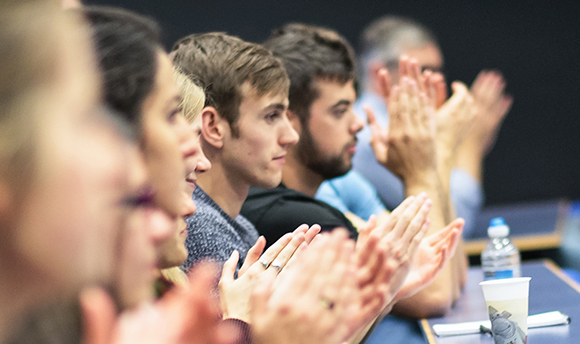BSc/BSc (Hons) Nutrition
On this course you will learn the scientific and social importance of nutrition in a modern university with advanced equipment. Real-world voluntary experience will foster your practical skills. It is accredited by the Association for Nutrition (AfN)*
Nutrition affects everyone in the world every day. What and how we eat is vital to individual and community health and it is an engaging and rewarding subject to study. You will learn the academic principles behind food and gain practical skills in our advanced laboratories. You will also learn how to think on a larger scale. What are the social, political, cultural and environmental factors affecting what we eat? How can nutritionists use evidence to support behaviour change at an individual, community and population level? What are the most current issues in the field of nutrition?
Why QMU?
- You will learn from registered nutritionists who are actively researching some of the most interesting and influential topics in the field.
- You will build professional proficiency in our labs, using advanced equipment and proven research techniques.
- The course is accredited by the Association for Nutrition (AfN).
About the course
If we are what we eat, then nutrition can tell us a lot about who we are, how we live and how we can improve the health of society. As a science it looks at how food affects the functioning of the living organism. It includes the study of food composition, how it is digested and absorbed, the production of energy, elimination of wastes and all the syntheses that are essential for growth, maintenance and reproduction across the life cycle.
In Years One and Two you will forge a solid understanding of the biological sciences. You will learn the fundamental principles of nutrition and integrate this with knowledge of other related disciplines. Modules will help you to develop core study and professional skills as well as laboratory and investigative (information technology and research) expertise.
In Year Three you will look at how nutrition influences health at the individual, community and population level across all stages of the lifespan. You will learn to identify reliable sources of information and critically evaluate them, building on skills from Year Two, and develop other key professional skills such as communication.
In Year Four you will focus most of your time on developing your individual research project. You will choose an elective module that interests you; either Health Entrepreneurship or Nutrition in Practice, which allows you the opportunity to develop a nutritional intervention in a population group of your choice.
Structure
You can take an honours degree over four years or an ordinary degree over three years. The modules and options for each year are outlined.
*NB the ordinary degree does not lead to registration with the AfN
Modules
Year One
- Physiology
- Biochemistry
- Introduction to Food Science
- Contextualising You and Your Profession
- Cell Biology and Genetics
- Food, Lifestyle and Society
Year Two
- Dissertation
- Nutrition Through the Life Course
- Disease Aetiology and Management
- Clinical Nutrition
- Epidemiology in Public Health
- Volunteering Experience
Year Three
- Disease Aetiology and Management/
- Dissertation
- Nutrition Through the Life-course (plus tutorials in Research Techniques for Nutrition)
- Epidemiology in Public Health/ Volunteering Module
Year Four
- Current Issues in Nutrition Science
- Food and Nutrition Policy
- Honours Project
- plus one of the following two options: Health Entrepreneurship or Nutrition in Practice
The modules listed here are correct at time of posting (April 2021) but may differ slightly to those offered in 2022. Please check the website for any updates.
Teaching, learning and assessment
You will learn in lectures, seminars, practical workshops and laboratories. Outside these timetabled sessions you will be expected to continue learning through self-study. You will be assessed by a variety of methods.
Placements
Practical learning in real-world environments is the perfect way to consolidate your skills. In Year Three, students will organise their own compulsory volunteering experience. This can be in a variety of settings such as schools, community groups, laboratories, care homes or food and drink companies. Students may even wish to volunteer overseas.
Exchange opportunities
In Years Two or Three you have the opportunity to study for one semester at a university overseas (subject to availabilty). For more information, see Exchanges and Study Abroad
On December 24th 2020, the UK Government announced that as an outcome of Brexit negotiations, the United Kingdom would not be seeking to participate in the Erasmus+ successor programme.
From 2022/23 Queen Margaret University will no longer operate under the Erasmus+ scheme. Over the coming year we will be working with new and existing partners on study abroad and exchange opportunities for the 2022/23 academic year and beyond.
Careers
Our graduates work across a number of sectors including government, third-sector and private companies.
Entry requirements
Scottish Higher: Standard - BBBC, Minimum - BCCC
A Level: BB
Irish Leaving Certificate: H2 H2 H3 H3
International Baccalaureate: 26 points
International: IELTS score of 6.0 with no element below 5.5
Required subjects: Chemistry or Biology and preferably one other science (may include Maths or Home Economics) at Higher/A Level or equivalent AND Chemistry, Biology, Maths and English at Nat 5 GCSE.
Mature/Access: We welcome applications from mature students with relevant qualifications in Biology and Chemistry or experience. See related Access courses: www.qmu.ac.uk/college-qualifications
Direct Entry:
Year Two
- HNC in a related subject with B in the graded unit
Year Three
- HND in a related subject with CB in the graded units
For details of related HNC and HND courses, see: www.qmu.ac.uk/college-qualifications
Other requirements:
- You may be requested to be immunised against Hepatitis B.
- Students may require a PVG check for the Volunteering module.
Professional registration/accreditation
- The course is accredited by the AfN.
- As a graduate you will be eligible to register on the Voluntary Register of Nutritionists with the AfN.
Teaching staff, class sizes and timetables
For more information, please see ‘How we teach and how you’ll learn’.
Awarding body
QMU. For more information, please see ‘External Review’ section on the ‘How we teach and how you’ll learn’ page.
View open day course presentation
Please note:
The delivery of this course is subject to the terms and conditions set out in our 2022/23 Entry - Terms and Conditions (Undergraduate).
Teaching staff may be subject to change.








